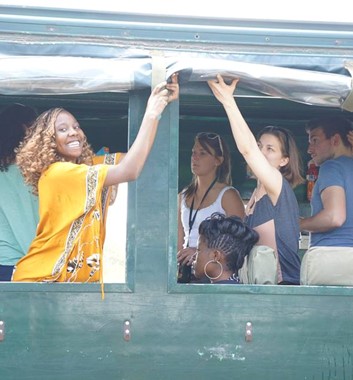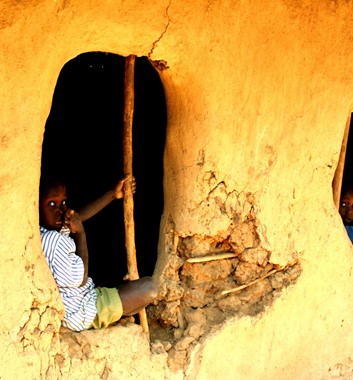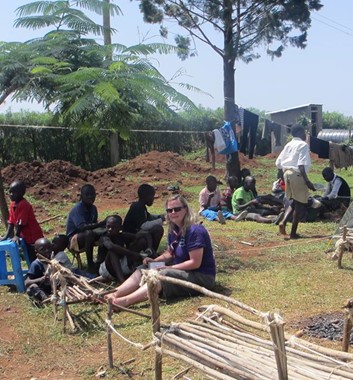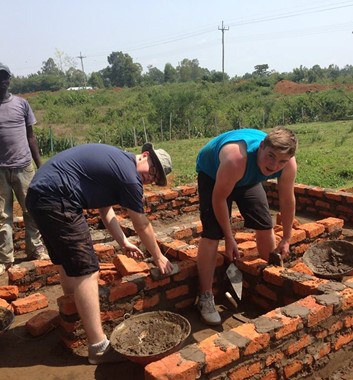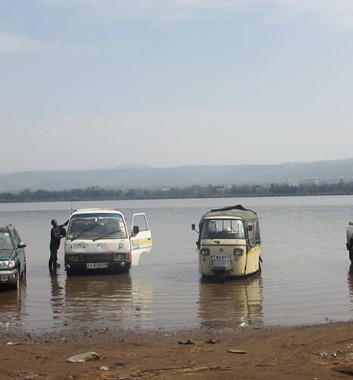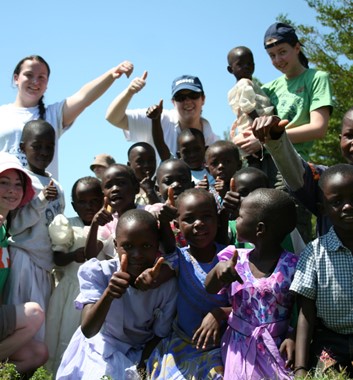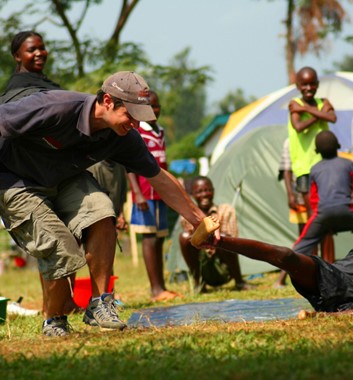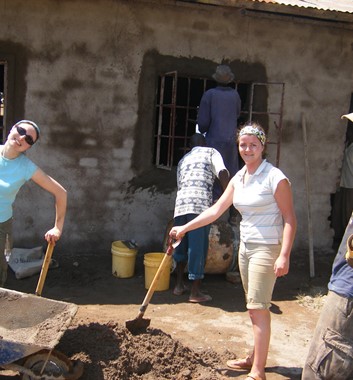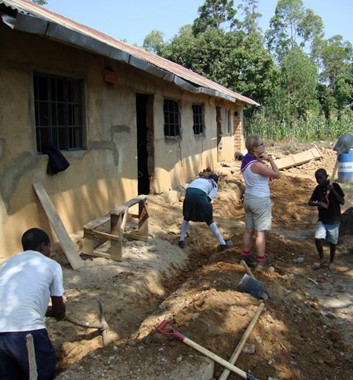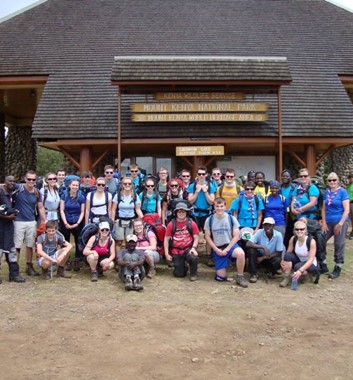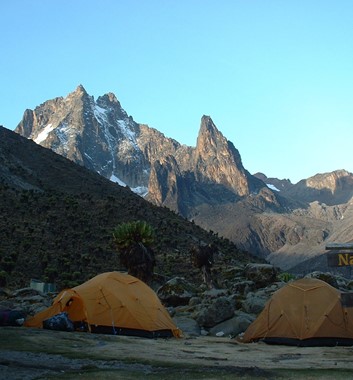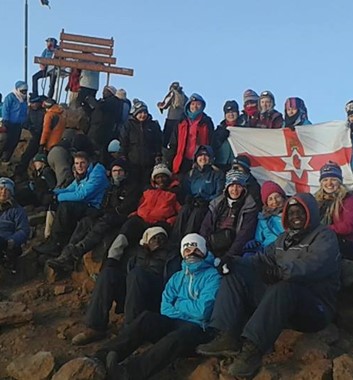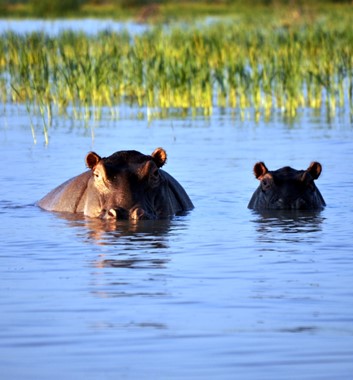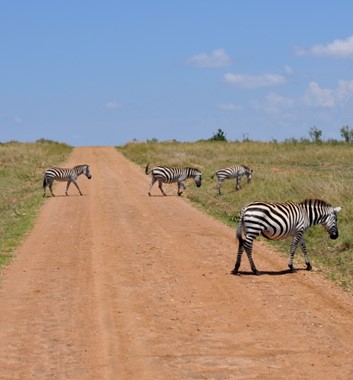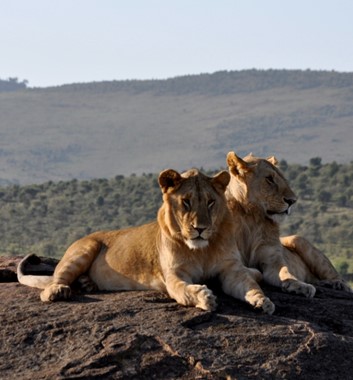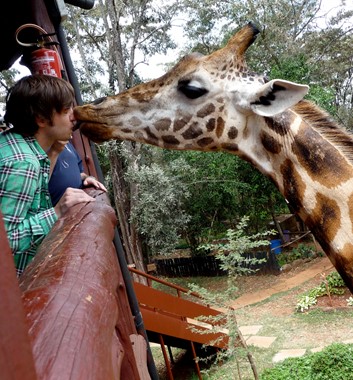Overview
Kenya school expedition
Have you ever wondered how useful a school expedition is to the young people going, and also the community receiving them? As a parent or teacher, are you desperate for your son or daughter to go on a trip that genuinely teaches self-reliance, offers an adventure but also actually benefits another community?
We agree with this sentiment, it's one of the reasons that our Kenya school adventure trip has changed little since it first started in 1991; we continually see young people coming out who want to see their morals and values challenged, and who want to come home feeling they have 'made a difference'. This video taken by one of our 'Africampers' in Tanzania tells the story well.
We also have over two decades of evidence that the service element has changed lives and communities in Kenya too. Most of our Kenyan staff attended the jamborees we ran in the 1990s, they are now middle class with children of their own. We are founders of the Fair Trade Volunteering movement, and our projects and programmes are determined by the charity Moving Mountains Trust. It's really a case of personal development and international development given equal status, which is how we believe it should be.
This video shows some of the reactions of students from Canada and Kenya during one of the Kenya school adventures:
Safety on the Kenya school expedition
This Kenya school trip is very organised, well staffed and very safe, our track record speaks for itself. We have never had a single problem with any group, and we attribute this to two things. One is having such a deep and comprehensive understanding of the country, and the second is that after so long we have a remarkable network of support which is a very protective and reassuring aspect of the trip.
In the 1990s there were never any problems in Kenya, it was and still is a safari jewel. With the benefit of hindsight we can see how the political geography changed and affected tourism, yet even now Kenya attracts well over over a million visitors every year and the cases of foreigners being hurt are almost negligible. From a security threat point of view, Heathrow airport is more dangerous than Kenya.
Perhaps most importantly, our programmes are so far from any area that is on a travel advisory list, that our groups never see or hear anything which might be construed as dangerous. Schools and children's homes in remote parts of Kenya, small communities and villages in central Kenya, the glorious uplands of Mount Kenya, a National Park...all these places are very far removed from places like the Somali border, which in real terms is many days travel away.
Our vehicles and staff are our own, and every trip attracts a large following of supporters and stakeholders. Local villagers, teachers, Doctors, government authorities, local police, tribal elders, village committees, social workers and many children all take part in these trips, and in all our years of running this trip we have simply never experienced any sort of security issue.
We stopped taking our groups to the coast many years ago, and we always stick to the places we know well and where we are so welcome. We have never had to cancel a trip, and we have very close links with the Kenya Tourist Board, the Foreign Office and many other tour operators who all share knowledge and experience.
Kenya school adventure - what do we do and how did it begin?
This trip began in 1991 with a Jamboree for street children run by Gavin Bate and the Kenya Scout Association, in an attempt to encourage those children to go to school and become rehabilitated. The programme was fairly successful, but the camps (known as 'Sisi Kwa Sisi' meaning 'one to one') really touched a chord. Gavin invited young people from the UK to join and run these camps and built up an annual event which is still running now. The camps offer a chance for young people to have fun, learn and socialise, be safe, gain self esteem, go on adventures, camp, have bonfires and games; in short, to be children.
Sisi Kwa Sisi became 'Africamp', originally a month long adventure (when it included travelling down to Mombasa and Kenya's coastline) for young people (foreign and Kenyan) which began to include renovating schools and doing essential project work in remote areas using money that was raised by Gavin when he climbed Mount Everest several times. The charity for this was Moving Mountains, which Gavin started at the same time as Adventure Alternative. Gavin had spent time in the aid industry and had strong ideas about long term sustainable development. The fact that this programme is still going strong now is testament to it's longevity.
Aside from project work and a camp for children, the trip includes a climb to Point Lenana on Mount Kenya, Africa’s second highest trekking peak (4,985m/16,355ft). This is a wonderful safe adventure, for many young people the first time they have ever climbed a mountain and camped out for a week. We always taken Kenyans as well, so it's a multicultural event, and a major achievement to stand on the top.
Finally the expedition includes an overland safari adventure to experience some more of Kenya’s diverse culture and abundant wildlife. We have overland safari trucks which become a mobile home, trundling across the plains of the National Parks, Conservancies and Reserves. The group camp and live together in a happy spirit of teamwork and joint experiences. For many, the whole experience is a transformative one, influencing their life choices and morals.
Groups on a Kenya school adventure
We really like to establish long term relationships with schools in the UK because a lot of the Kenya school trip happens at home, with training events and lots of preparation. Clearly there is fundraising to be done, but just as importantly we provide a long lead-in time for the students and teachers and parents. We try to involve multiple departments because this trip touches so many disciplines.
We have been working with schools in South Wales now for over ten years. Children sign up to 'Africamp' early to get a place and for many of them the experience forms the basis for their personal portfolio. Some of them go on to do internships with us, and even work for the charity. Here's some reflections of students arriving in Kenya and meeting their fellow 'Africampers':
This level of preparation is unusual in our experience and teaches a wide range of personal development skills prior to the trip, which have great relevance to modern society and our place in it. Global citizenship and social responsibility are promoted, as is personal self esteem and in particular stereotyped attitudes to aid, race and development.
The groups generally number 20 - 25 and normally come from one school, although we do run open trips which are the scheduled dates on this website. Normally an initial enquiry precipitates a visit and a plan for a school trip that fits into the curriculum and also is determined by Moving Mountains. We feel very strongly that a trip like this must have a dominant developmental influence.
Kenya school adventure - personal development and international development
The Kenya school adventure, or 'Africamp' as people like to call it, gives young people a chance to see the flipside of life in Africa and challenge themselves in many ways, both physically and mentally. It's not just about the building project and the kids camp, working with an NGO in different areas of development work and interacting with people from a different culture are life skills. Of course it provides a boost to the CV for job or academic applications, but we believe it also is part of maturing and making decisions about what to do in life.
Sometimes people think that these benefits are for the visitors only, but this is not so. The children in Kenya who took part in Sisi Kwa Sisi and then Africamp have given us many stories of positive growth and great achievement. Because of the opportunity they had to simply interact and camp and talk and share with people from other countries, they went on to work hard and become something in life. They went to school and college and into employment, they became parents and their children never suffered the same privation they did, and they look at Moving Mountains as a surrogate family which has given them long term support all the way through.
Do look at our Moving Mountains pages and our videos, there are so many heartwarming stories which turn all the criticisms of trips like this on their head. The truth is that if you truly have a long term vision in mind, and the motivation to make it happen, then it can really change lives. That is the legacy of our Kenya school adventure, something we are inordinately proud of.
Here's some of our students giving their thoughts on how much this trip changed their lives, recorded just the night before going for the summit of Mount Kenya:
Dates & Bookings
Itinerary
Kenya school expedition itinerary
The itinerary follows a tried and tested plan of spending time with the NGO Moving Mountains on a project or programme which is determined by the charity according to its long term aims and objectives.
The itinerary then moves to Mt Kenya for a five day / four night guided trek to Point Lenana, followed by an overland safari for a few days and then some more overland travel on our safari to one of Kenya's Conservancies, National Parks and / or Reserves and the Rift Valley, ending up back in Nairobi for departure home. The whole Kenya school adventure amounts to three weeks away, however some of our schools prefer to adjust this to longer or even shorter trips, and of course we can adapt the itinerary to fit in with specific preferences.
Here's a video from one of our Canadian groups filmed by our good friend and film maker Elia Saikaly showing a little of what they did during their Kenya school adventure:
We use a lot of sport and games to help kids, but we also have the technology to reach out to young people at home too. This video shows how a Canadian/Kenya football game became a phenomenon that was shared with thousands of school kids over the net:
The climb of Mount Kenya is a lot of fun but a big challenge too, we have excellent staff and we provide training for this part of the trip:
Our itinerary is quite flexible but it always includes something that benefits Moving Mountains and some sort of challenge and a safari adventure in our overland trucks. We really work with schools and groups to design something that works for them, and also responds to the local needs. Here is a typical three week programme:
| Day | Information |
|---|---|
| Day 1 | Arriving Nairobi, preparation for the project and meeting staff, and introduction to Kenya, the company there and also the charity Moving Mountains. |
| Days 2 - 10 | Running the summer camps for Kenyan children supported by the charity and/or renovation or construction work which is supervised by our staff. Sports activities, teaching, crafts, and music, home visits, and lots of activities while camping, including day trips to places of local interest. |
| Day 11 - 16 | Central Kenya and trek up to the peak of Point Lenana on Mount Kenya. Includes travelling to Naro Moru, visiting the Mau Mau caves, the Equator, preparing for the expedition (shopping etc) and training, followed by five days on the mountain itself. |
| Days 17 - 21 | Safari in Ol Pejeta Conservancy and the Rift Valley. This section of the trip travels through Kenya visiting Ol Pejeta and Hells Gate National Park, seeing wildlife and some of the amazing natural sights like Thomson's Falls and Lake Naivasha. The trip ends with going back to Nairobi airport and the flight home. |
DAILY ROUTINE
Every day is really quite different, and you will soon learn to operate to a different rhythm of Africa. There are long days and very active ones, either managing the camps or the projects, climbing a mountain or travelling through national parks to see animals. It is important to rest properly and stay hydrated! Meals are prepared every day, but everyone helps out, and there is always shopping to do, and always lots of time spent with the locals. The children especially are very keen and eager, they have waiting for their summer camp all year! There will be visits to all sorts of places, activities to organise and so much to do that sometimes the days don't seem long enough.
Cost
School Expedition to Kenya cost £2,495.00
The cost is based on a minimum group of 10 pax on the advertised 'open' trip, individual school trips are tailor made and costed to suit the itinerary and size of the team attending
INCLUDES
- Adventure Alternative UK expedition organisation
- Adventure Alternative Kenya staffing and ground logistics
- All internal transport in private vehicles, including airport transfers
- All meals and bottled water
- Accommodation provided in safari tents (mountain tents on Mt Kenya)
- Guide and Porter support on Mt Kenya
- All Conservancy and National Park fees
- All tourist activities in the itinerary
- Amref 'Flying Doctor' support
EXCLUDES
- Moving Mountains fundraising - minimum of £500
- Return flight to Nairobi
- Travel Insurance
- Kenya Visa
- Travel vaccinations and anti-malaria tablets
- Personal spending for souvenirs, snacks, etc
Fundraising aim
Aside from the expedition cost paid to Adventure Alternative all participants are required to raise a minimum of £500 for the Moving Mountains Trust. This amount funds the costs of the kids camp, Moving Mountains Kenya staff, the developmental project which you will be involved with and all our other projects in Kenya.
Here is a video which shows you the sorts of projects that the money supports and where some of the Kenya school expedition teams visit. You will see there is a lot of history behind some of the social problems, and our vision is always long term:
Travel Insurance - you will need travel insurance for this trip, and normal holiday travel insurance is adequate as long as it covers trekking. We advise you to get this insurance early on, so that if you have to make a late cancellation for some reason then you will get all your money back.
LOCAL PROVIDERS
Aside from the investment in Adventure Alternative Kenya, there are many more local providers who have benefitted from our model of responsible tourism, and they are small family run businesses like the Blue Line Hotel, our base for all our climbs and expeditions on the Mt Kenya, which continues to develop and expand as a direct result of the business that is provided through Adventure Alternative.
Fitness
Kenya school expedition - fitness and terrain
You do not need to be super-fit for this trip, however the expedition element is moderately demanding with some long days of sustained walking with a backpack. The effects of altitude will also further tax your body. But it's great fun doing it as a team and enjoying the amazing feeling of standing on top of Mount Kenya at dawn.
Climbing Mount Kenya is not a technical climb and there are no precipitous drops along the way, no rock climbing or specialist equipment needed. The paths are in good condition and well trodden; some are steeper than others and it is much quieter than 'Big Brother' Kilimanjaro, you could spend five days on Mount Kenya and only meet the Park Rangers positioned at each camp. On summit day the path is mostly scree, which can be loose and unrelenting, especially on the descent when your knees will probably suffer.
The terrain on Mt Kenya varies throughout which leads to an interesting and ever changing environment. In a period of five days you will go from cultivated farmland through equatorial forest and alpine heath, across a lunar-like rocky landscape up to a glaciated summit. Mt Kenya’s unique position just above the equator offers an opportunity to experience so much in one expedition.
Here's one of our Canadian school trips on their summit day to the top of Mount Kenya:
And here's the same team climbing through the lower forest areas:
On the project phase you will not be moving very far from the camp which will be immediately adjacent to the project. This is normally in the grounds of a school or the Ulamba Childrens Home. There are really no issues here at all, just keeping clean and hydrated and well rested since it's often very tiring looking after a kids camp all day!
During the safari bit of your adventure, you will be entering reserves/parks usually consisting of dirt roads and sand tracks and not tarmac. If conditions are wet this can lead to adventurous driving but be assured that our drivers are well versed in safe and professional driving skills. If the weather is very dry then the terrain can be dusty so it's worth bringing a shawl or light scarf to cover your mouth and nose. The vehicles are well maintained and professional safari vehicles.
Kit List
Kenya school expedition kit list
- 65-75Litre Rucksack (put in duffel on plane) and cover
- 80-120L duffel
- 45Ltr Day Pack
- Stuff sacks, waterproof, various sizes
- Waterproof shell jacket and trousers plus gaiters
- Fleece jacket
- Fleece tops or jumpers
- Trekking trousers, snorts
- Trekking shirts
- Thermals or base layers, tops and bottoms
- Warm hat, neck buff, sunhat
- Sun glasses
- Gloves
- Socks, thin ones, trekking ones and thick ones
- Wakiing Boots, trainers, sandals
- Walking Poles, useful for coming down on the mountain
- Working clothes for project and camp - general selection jeans, tops etc
- 3-4 season sleeping bag (comfort temperature approx -5 deg C) and a compression sack to keep it in
- Sleeping bag liner, made out of cotton, useful to keep bag dry and clean
- Sleeping mat
- Head torch & spare batteries
- Camera, memory card & batteries, phone, mp3 player etc, plus chargers (normal three pin plug is fine)
- Water bottle
- Wet wipes, toothbrush and paste, washkit, hand gel
- Personal Medical Kit - Paracetamol, hand gel, antiseptic wipes, plasters, blister plasters, zinc tape, insect repellant, lip salve, throat lozenges, rehydration sachets (Dioralyte), sunblock cream, water purification tablets, personal medication like inhalers,
- Anti-Malarial tablets as prescribed
Don't forget:
- Passport
- Student Card
- Insurance policy Number & emergency telephone number
- Money
- Plane Ticket confirmation & numbers
- Books, cards, games, diary
- Photos of family, house, home area etc to show to your new friends in Kenya, they love to see where you come from!
Note: you must check with your GP for your personal suitability to all medicines and their possible side effects and interactions. Please inform us of the details of all regular medication that you intend to use though the course of your trip and any relevant allergies and medical history related to them.
You also need to check the requirements and regulations of the airline and all countries visited in relation to medications. For example; laws governing transport of some pain control medication and the need keep insulin at a suitable temperature, i.e not in the cargo hold.
Clothing tips for Kenya school expedition
- Make sure hiking boots are leather (fabric boots should have a waterproof lining) and broken in.
- Clothing for the mountain needs to be quick drying in case it gets wet. Make sure that you have two changes of trekking trousers and a base-layer top and a fleece top as well as a warm coat. It can be well below freezing at night on Mt Kenya and on the first half of summit day.
- Your sleeping bag should be at least three season and you also need a good sleeping mat for insulation. You can take a sleeping bag liner made out of cotton which adds warmth and also keeps your sleeping bag clean. You can make this out of any bedsheet sewn up the side to make a bag.
- You will be able to wash clothes - handwash in washing powder, that is. The problem is trying to dry things so you may only have the opportunity to wash smalls. On the mountain there is no opportunity to wash clothes at all.
- Take old clothes to wear for the project and camp, they will get dirty, and covered in paint quite possibly. You need travel clothes which are clean for the travelling home bit, and for safari, but on the camp and project it will be pretty dirty. A lot of people just leave stuff behind because it’s not worth taking home! Similarly with shoes, bring a pair of comfortable old shoes for the camp, and some heavier boots for any work on the project.
- If you wear contact lenses take plenty of saline and comfort drops- it can get dusty.
- Mosquito nets are optional. The tents have inbuilt nets and people in the past have generally not had a big problem with insects.
- Do not bring porcelain plates - bring plastic and a few spare spoons - they always go missing. Make sure that plates and bowls are of a generous size so that you can fit the food in; you will be hungry!
- Girls will have to dress conservatively in shanty towns and in public. You will draw unnecessary attention to yourself and maybe cause offence if revealing clothing is worn. If you do not bring appropriate clothing you will either have to buy more when you arrive or risk not being able to take part in many activities.
- Keep your money somewhere safe in a bumbag. Do not bring large wads of notes with you. If you take sterling cash with you make sure they are Bank of England notes, not regional notes, eg Northern Irish notes or Scottish notes.
- For the mountain, work on a layering system which gives you versatility - Tshirt or thermals, shirt or warm top, fleece, waterproofs. Gloves and hats are vital, as are sunglasses and suncream.
- Your rucksack will need to carry everything on the mountain including food and stoves and tent. But during the camp a rucksack can be annoying to keep on emptying out to find stuff so you might want to bring a duffle bag as well.
It is likely that a large number of you will be buying similar (if not identical) items. If so, get together and visit a shop together, speak to the manager and say that you have a potentially big order and negotiate a discount. Tell them about the trip and that you will be doing charity volunteer work. Most companies are fairly flexible in this regard. Also, no need for all of you to bring a seperate roll of toothpaste, there's lots you can share and save weight on!
Why Us
Kenya school expedition - why us?
This trip has been running since 1991 and has successfully delivered a great and influential experience to thousands of young people, both in the UK and in East Africa. It's essential make-up is the same, and it's still just as popular with students now as it was in the days before mobile phones and facebook. We have not diluted the adventurous nature of it, and we haven't pandered to dumbing down the whole experience of travelling to a new country and culture.
The safety aspect is unrivalled. We have passed the British Standard 8848 audit for overseas youth expeditions, and our staff have been running this trip for (in some cases) well over a decade. The Kenyan staff are brilliant at their job, and in many cases attended the original trips as children back in the 1990s.
We have our own company in Kenya, our own vehicles, equipment, office and full time staff who are well looked after. Nothing is outsourced, everything is checked.
The company works alongside the charity Moving Mountains to make sure that this is not over commercialized, or marketing on young people's desire to help others. We have serious developmental aims, well evidenced and documented over many years now, and we run this programme with an emphasis on the long term benefits.
Our partnerships with schools, communities, villages and the authorities span decades now; we are absolutely confident that this trip does not fall into the traps of short termism, or perpetuating damaging stereotypes of aid. Our experience is that this trip has only ever given all the young people involved a great adventure, lots of self esteem and lots of motivation to make something of themselves.
Have a look at the video below, made by our Canadian friend Elia Saikaly who brought a Canadian team of young people on a Kenya school expedition to work on one of our projects called Solio, a community of 17,000 internally displaced people living near Mount Kenya. These two videos show the progression of the project they took part in, and how their trip contributed to our long term vision.
Also!
We are fully registered, insured, financially protected and established both in the UK and in east Africa. We are well known to the education authorities, the family courts, the social welfare offices, the village committees and many stakeholders who all advise and guide us properly so that we never fall foul of exploitative tourism.
We have strict policies on selection, training and preparation for all our trips, especially where they involve children. We have no truck with orphanage tourism, slum tourism, poverty tourism or indeed financial exploitation of local people. These Kenya school expeditions have provided a benefit to so many schools, children and communities that we believe we speak with great authority on this subject. Please take a look at the Moving Mountains website to see just how our vision has come to fruition.
Photos
Choose a scheduled date or contact us to set up private dates or a bespoke itinerary. The minimum deposit is £100.00 and the balance is due four weeks before travel.
Having been to Africa a couple of times before this trip to Kenya I had a pretty good sense of what to expect and I was …
Read More Mike (Canada)- Duration 3 weeks
- Numbers 25
- Challenge Moderate
- Comfort Camping
- Kenya volunteering activities
- Health and altitude
- Mount Kenya food & lodging
- Mount Kenya advice
- Mount Kenya books & maps
- Personal health in Kenya
- Safari Photography
- Volunteer Ethics
- Volunteer preparation
- Kenya preparation
- Travel Insurance
- Trekking boot advice
- Volunteer fundraising guide
- Volunteer guidelines
- Kenya school trip kit list
- Avoiding malaria
- Travel vaccinations

